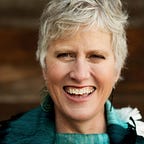Can we talk about being white?
A number of high profile white women in the life coach, business, and empowerment space are stepping into dog doo with their responses to the racial tensions appearing in their social media feeds. They are reacting in a host of ways: shutting down feeds, defending themselves, ingratiating themselves and getting very emotional publicly. The good ones are reaching out for help, and I’m trying.
But they don’t want to talk to me. White people trying to fast-track becoming woke seem to feel they must do it by turning to people of color to learn about race. We seem to need to hear black stories of oppression and rage in order to convince ourselves that the stories are actually real. White people are asking black people right now to effort in huge ways and to expend energy, time, stories, history, sweat, air, and pain for the benefit of our learning.
I absolutely believe that amplifying black voices and thought leaders matters, and I am 100% in for doing my part. Yes to that.
But it is not enough. My black friends and colleagues are telling me, “we are tired.” Really freaking tired. More tired than ever. Even black coaches and consultants in the diversity and inclusion realm are saying that the exhaustion of educating white people about privilege, bias, history, systemic advantage, and racism is getting damn old.
My question for white people, especially white women, is this: what happens if we start talking to each other about whiteness? About our own identity as white people and the privileges it has afforded us? What if we talk about how are daily lives are impacted by our whiteness and what it feels like to know that white people like us have perpetrated horrific abuses against non-white people? About how the systems of education, business, healthcare, media, and politics are actually designed to benefit people who look like us? I am proud of the work my colleagues and I do with the consulting firm WMFDP with white men in companies, but in the culture of white women, social media, small business, and coaching, I am not seeing it. In fact, I feel white women actively avoiding it.
@sonyareneetaylor spoke about this powerfully on IG today — thank you, Sonya Renee. We (white people) are talking all over about black lives and race and their black friend/husband/step-child/boss and whether black people feel this or that. We are also asking questions to benefit our own education: “What is red-lining actually? What do black people want to be called? What do black cops think? Do you have examples that have happened recently here in our town?”
White people, we need to talk to each other about being white. Not to center on ourselves, not to be silent publicly, and not to dismiss black voices. Hell no. We need to talk to each other because we built and perpetuate the mindsets, believes, and systems of oppression that keep it going. If we do not change, nothing changes.
We need to find the slides, quotes, books, statistics, data and policies and orient to the history we were not taught or did not learn. Let’s rant and rage and wake-up and explore and own our identity as white people, which we may never (not even once) have considered. Let’s feel the pain of that. Let’s look in the mirror about what that means. Let’s understand that what happens at work, at the salon, at the market, and at school for black people today is very different than we know and that our white skin may mean that even when we worked hard, we had advantage.
We need to do this, not at all at the exclusion of talking to black people, but for the purpose of getting our shit together. We need to do this because if we do not, we will very likely forget this moment (like we always do) and center on our sadness about the plight of race in America. We need to do this so that we do not act out all over people of color with our fragility, our shame, and our cluelessness, hoping that they will listen and put us back together.
When we ask black people to sit in the teacher’s chair and give us a clue, it is an inhumane act. It is passive. It is false. It implies that we are empty of thought, history, opinion, capacity, effort, and experience: blank slates on which we expect black people to paint the picture for us.
For black lives to matter for real to us (white people trying to be anti-racist) let’s talk about whiteness. Othering on blackness is just another way we use our privilege without any grace at all.
What is it like to be white for you?
I want to know. I want to support you, to challenge you, to help you get a clue and I want you to do the same with me. I want to talk with you so that the next time you are with a black person, you are so sturdy that you can actually carry some of the load of anti-racism and not just stand there, gaping, taking notes, and feeling incredulity and pity.
